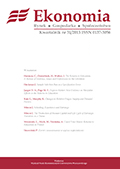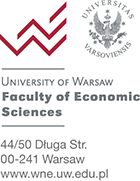
ISSN: 0137-3056
MoSaHE points:
13
Editor in chief:
prof. dr hab. Tomasz Żylicz
tzylicz@wne.uw.edu.pl
Editorial assistant:
Marta Höffner
ekonomia@wne.uw.edu.pl
(48) 22 55 49 184
Publisher:

Ethical standards
To guarantee quality of published texts and compliance with the highest standards of scientific integrity, editorial board of quarterly journal Ekonomia maintains and enforces ethical standards applicable both to Authors and Reviewers and members of the Editorial Board.
1. Rules for Authors
-
Authorship
-
The author(s) of the text are only those individuals who have made a significant contribution to its creation. Unacceptable is practice of omitting actual authors (ghost writing) or identifying as authors people who did not contribute to the creation of the text (guest authorship). Before submitting the text, make sure that all authors have been identified and approved the final version of the text.
-
-
Conflict of interest
-
Author should in their work disclose all sources of project financing, contribution of scientific research institutions, associations and other entities and any significant conflicts of interest that may affect the results or interpretations.
-
-
Multiple publications
-
Texts submitted to the journal should be original works, respecting the copyright laws of third parties. Texts cannot be previously published, it is unacceptable to submit the same text to two / many journals or to submit the same text at the same time to another journal. Unethical practice is also to translate a research article, which is a translation of the text published in another journal or submitted to another journal.
-
-
“Salami” publications
-
Publication of a “salami” means a preparation of a number of texts on the basis of the same data set, using the same sample, methodology, hypotheses. If the foundation of the work is a large set of data, it is necessary to determine how the analysis and conclusions presented in the text relate to other analyses and conclusions based on the same data set.
-
-
Plagarism/Autoplagarism
-
Plagiarism is the use of the work of another author without showing that in the text. Quoted phrases, sentences, data, elements of the analysis, thesis or conclusions of other authors must be properly marked in accordance with the rules of citation and bibliographic record. It is also reprehensible to recall own unmarked fragments of already published works.
-
-
Forgery and fraud
-
Creating data, misrepresenting in the description the manner in which it was gathered, distorting collected data to fit set beforehand assumptions, reaching conclusions that are not justified by the collected material all are serious violations of the principles of fairness and scientific research.
-
2. Rules for Reviewers
-
Objectivity
-
Reviews should be prepared objectively on the basis of scientific arguments and their goal should be fair and honest determination of the scientific value of the text and, if possible, constructive and competent feedback indicating a way to improve the text.
-
-
Confidentiality
-
Reviewed texts are confidential documents, they cannot be shown to others or used for personal gain by the reviewer.
-
-
Anonymity
-
Reviews are performed anonymously. Editorial Board will not share the authors’ personal data with the reviewers and reviewers’ personal data with the authors. If, despite the anonymization of the text, reviewer guesses who the author is, she/he should inform the appropriate deputy editor and resign from the preparation of the review.
-
-
Conflict of interest
-
Reviewers should not prepare a review of the work, if there is a conflict of interest or the circumstances that parties may be suspected of the conflict of interest.
-
-
Puntuality
-
If the reviewer is not able to prepare the review within a prescribed period she/he shall inform the appropriate deputy editor or assistant editor.
-
3. Rules for Editorial Board
-
Responsibility for the publication of articles
-
Decision to publish is taken by the appropriate deputy editor in consultation with the reviewers and, if necessary, the editor in chief. In special cases, the decision to publish may be taken by the Editorial Board.
-
-
Impartiality
-
Texts submitted for publication are evaluated on the basis of merit. Their evaluation is not affected by subjective factors.
-
-
Confidentiality
-
Members of the Editorial Board cannot disclose information about the texts submitted for publication to persons other than the authors, reviewers, and persons responsible for the publishing process.
-
-
Preventing conflict of interest
-
Editorial Board avoids any situations that may result in a conflict of interest or suspicion of the existence of such a conflict.
-
| home about "Ekonomia" databases | issues current issue archive | editorial board program board scientific editors | for authors information guidelines |